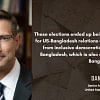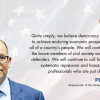What does President Biden's letter to PM Hasina mean?
When Prime Minister Sheikh Hasina emerged victorious in the national polls on January 7, the US concluded that the elections were not free and fair. Almost a month after, US President Biden has written a letter to PM Sheikh Hasina, expressing willingness to work together. In light of this recent development, Michael Kugelman, director of Wilson Center's South Asia Institute, speaks to Porimol Palma of The Daily Star, decoding the possible implications.
Does the letter indicate that strains in the relations between the two nations are now being repaired?
I'm not actually that surprised about this letter from Biden. The relationship was trending in this direction, one defined more by interests than values. The US had reined in its rhetoric on rights and democracy in the weeks prior to the election. The previous statement characterising the elections as not free and fair didn't have a sharp tone, and it emphasised the importance of cooperating on geopolitical issues.
It would be premature to cite this letter as evidence that the US has decided to end its experiment of using Bangladesh as a test case for its values-based foreign policy—an experiment that has introduced frictions into an otherwise healthy and growing relationship. US officials have made clear that human rights will continue to be a part of the relationship.
But let's be clear: for Biden to write a letter to Hasina that speaks of a new chapter in relations emphasising economic and geopolitical cooperation constitutes a strong indication that Washington wants to make this relationship work, and that it wants to do so by focusing on the partnership's main drivers of cooperation.
Is the possibility of sanctions over?
One can't rule anything out, though it's safe to say that the harshest possible measures—such as trade sanctions—are likely off the table. One can't rule out some new visa restrictions or targeted human rights sanctions, depending on the outcomes of the US assessment of the election. But it's been nearly a month since the election, and every day that goes by makes those types of measures seem increasingly unlikely as well.

Do you think the escalation of the Myanmar crisis played any role behind this letter?
I don't think so. Yes, the Rohingya issue was mentioned specifically in the letter, and the administration certainly has concerns about the Myanmar crisis—albeit through a democracy-focused lens that wouldn't align with Dhaka's approach to Myanmar. But the conflict in Myanmar had been intensifying for months, and we didn't see any outreach like this from Biden earlier on. Also, the Myanmar issue does not play a strong enough role in the US-Bangladesh relationship to provoke a major bilateral development like this letter.
Since the Indo-Pacific issue was also mentioned in Biden's letter, similar to the State Department's statement on January 8, do you think it's a major factor driving the US' increased attention to Bangladesh?
I'd actually cast this in broader terms: yes, the Indo-Pacific issue is mentioned in both, but we should see this in the wider context of great power competition, because the Indo-Pacific issue is about US-China competition, after all. One of the main reasons why the US wants to deepen engagement in Bangladesh, and in South Asia more broadly, is to try to counter growing Chinese and (to a lesser extent) Russian influence in the region.
And yet, the US democracy promotion policy worked against this strategic interest. It emboldened Beijing and Moscow, giving them opportunities to make Washington look bad by accusing it of meddling in Bangladesh's internal affairs. And the policy caused friction with New Delhi, Washington's top partner in South Asia. There have been times when US officials have linked rights and democracy and free and fair elections in Bangladesh to a free and open Indo-Pacific. But that's a questionable position to take, given that India is a critical US partner in the Indo-Pacific, and its democracy has taken major hits—a development that Washington, for strategic reasons, says relatively little about publicly.
One of the most compelling arguments against pursuing the Biden administration's values-based foreign policy in Bangladesh has been that it works against the US' strategic interests, by boosting its strategic rivals and upsetting a key strategic partner. It looks like the Biden administration has now decided to give in to this argument.
The ruling party views that such a letter from the Biden Administration means the US is now normalising relations with Bangladesh. What is your take on that?
I don't think this is right at all. US-Bangladesh relations didn't need to be normalised. Let's keep in mind that the relationship has actually been growing significantly in recent years—on economic, humanitarian, military, and strategic levels. The tensions over rights and democracy may have taken centre stage in policy debates and media coverage, but they're a side show in the broader relationship that has performed quite well.
To me, the letter reflects that the administration has concluded it's time to make interests-based considerations a bigger part of a relationship that has flourished in recent years aside from frictions over the values-based elements.
Would you say the crisis in the Middle East or the US elections—later this year—are playing into Biden's approach towards Bangladesh?
Several of Biden's foreign policy positions—especially his position on Israel's war in Gaza—could well impact the US election, but US policy toward Bangladesh is not one of them. So, I don't think that's at play here.
I also don't see any direct link between the crisis in the Middle East and Biden's letter. There's no shortage of US allies and partners helping Washington wage its military campaign on the Houthis. There's no reason whatsoever to believe Bangladesh would take part in any US military activities in the Middle East. So it's not like the US would want to smooth over tensions with Dhaka to seek its cooperation in that region.
Is the US backing away from its democracy promotion efforts in Bangladesh because it's received so much heat for its unrelenting support of Israel's aggression in Gaza?
Perhaps, from the context of diplomatic damage control. But my sense is the biggest driver accounting for this new phase in US-Bangladesh relations is strategic considerations linked to great power competition, as Bangladesh rapidly becomes a battleground for geopolitical rivalry.
We welcome your contributions and analysis of global events. To submit articles to our weekly page, Geopolitical Insights, please send an email to [email protected]
Follow The Daily Star Opinion on Facebook for the latest opinions, commentaries and analyses by experts and professionals. To contribute your article or letter to The Daily Star Opinion, see our guidelines for submission.

 For all latest news, follow The Daily Star's Google News channel.
For all latest news, follow The Daily Star's Google News channel. 










Comments